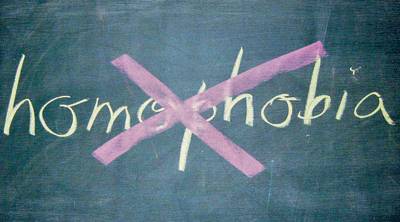The Supreme Court of the United States’ (SCOTUS) ruling on same-sex marriage for all US states has triggered much needed debate in Pakistan. For decades the country has been toeing the Saudi-Iran line on homosexuality: that the phenomenon doesn’t exist in Islamic realms and the exception to the rule is a physiological disease at best or a Zionist conspiracy at worst.
Facebook’s Rainbow profile picture filter has done what human rights activists, and infinite volumes off online and offline literature, hadn’t been able to pull off: creating awareness with regards to the existence of the LGBT (Lesbian, Gay, Bisexual and Transgender) community – or LGBTIQ including Inter-sexed and Queer people – in Pakistan.
A significant number of people supporting the SCOTUS decision, in a country where the popular mind-set calls for homosexuals to be stoned to death, might just trigger a rude awakening in Pakistan. It might even help the country overcome its inertial religious bigotry on the matter.
Ever since April 2003 when the United Nations mulled a resolution on the rights of homosexuals for the first time, Pakistan was dutifully against LGBT rights. Pakistan was among the five Muslim nations that derailed the vote in 2003 and among the 57 nations – spearheaded by the OIC – that protested against the UN General Assembly’s ‘blasphemous’ ruling in 2008, against LGBT discrimination.
Pakistan again took the same stance in June 2011 – albeit in a losing cause – when the UN Human Rights Council finally converted a decade of lobbying into a 23-19 vote in favour of LGBT rights. When the Human Rights Council went for the vote against anti-LGBT discrimination last year, Pakistan was one of the 14 countries that voted ‘No’.
The UN vote has evolved from 23-19 in 2011, to 25-14 in 2015. Considering that the voting itself was overturned just a decade ago, the global trend is clearly growing in support of LGBT rights.
It is important to note here that the UN Human Rights resolution from 2011, or the UN General Assembly’s declaration from 2008 which is still open to signature, doesn’t call for ‘promoting’ homosexuality, but demands acknowledgement of the LGBT as humans with basic human rights. Thus Pakistan refuses to accept the LGBT as fellow human beings, and this underscores the human rights situation in the country.
Serial killers like Muhammad Ejaz killing men for being gay, or TV anchors launching sting operations to ‘uncover’ homosexual relationships in private places, are just the tip of the iceberg. 87% of Pakistanis support harsh punishments for homosexuality – many calling for state-sanctioned murder – according to a 2013 Pew survey.
The literal interpretation of Islamic scriptures, quite often the foundation of an average Pakistani Muslim’s belief system, uses the example of the people of Lut to deem homosexuality as punishable. Some hadiths are quoted by many members of the Islamic clergy to promote the killing of LGBT.
While the Hanafi fiqh asserts that homosexuality doesn’t warrant physical punishment, and the Hanbali and Shafi schools call for harsher penalties, all Islamic schools of thought dub homosexuality ‘unnatural’ and ‘perverted deviation’ worthy of being punished.
Science, however, has presented biological rationale behind homosexuality proving it to be natural. Studies on neuroendocrine function reveal that estrogen and testosterone levels directly impact the central nervous system, which dictate sexual behaviour. This is why over 1,500 species depict homosexuality. Homophobia, to cite an anonymous quote, is found only in one species: humans.
As the rainbow display pictures of Pakistanis began to escalate, the homophobic fury rose in synchrony over the past week. Those ‘enlightened’ enough to ‘tolerate’ homosexuality, condemned its promotion and celebration. The counterarguments presented by those ‘progressive’ enough not to want the LGBT dead, were, typically, of the ‘cultural’ and ‘natural’ kind.
Those calling the existence of homosexuality as being against Pakistani or ‘Islamic’ culture seem to forget that feminism, or the act of women deciding their own fate, was against both rural and urban Pakistani culture not too long ago. It still contradicts the cultural sensitivities in many parts of Pakistan.
The rule of thumb in the modern world is that if a culture or religion contradicts human rights, it needs to evolve. With Pakistan, and the Muslim world, having acknowledged heterosexual women as human beings with rights – at least on paper – it would soon have to wake up and smell the coffee vis-à-vis LGBT rights.
Even if one were to ignore biological studies and peddle homosexuality as a choice, how hard is it to respect a choice, which affects no one, barring two consenting adults? But then again for a society still oblivious of the concept of marital rape, the very idea of consent, and its importance, is obviously alien. It is clearly too much to expect respect for others’ choice and liberty from people who burn properties and call for murders when their religious sentiments are offended by cartoons and YouTube videos produced thousands of miles away.
It is already decades too late to claim human rights to be a Western design, or to target their universality by clamouring for cultural considerations while dealing out basic rights for individuals. The fact that someone’s belief or sexual orientation hurts one’s sensibilities can no longer be used as a pretext to deny them those rights.
Everyone has a right to be against same-sex unions – just like one can be against inter-sect or inter-religion marriages. However, what one can’t be allowed to do in the modern world is prevent human beings from basic rights.
Those states denying human rights will have to evolve to stay in touch with the rest of the world. There will come a time when the LGBT have equal rights in our neck of the woods as well. It might take decades, or even a century, but eventually it will happen.






